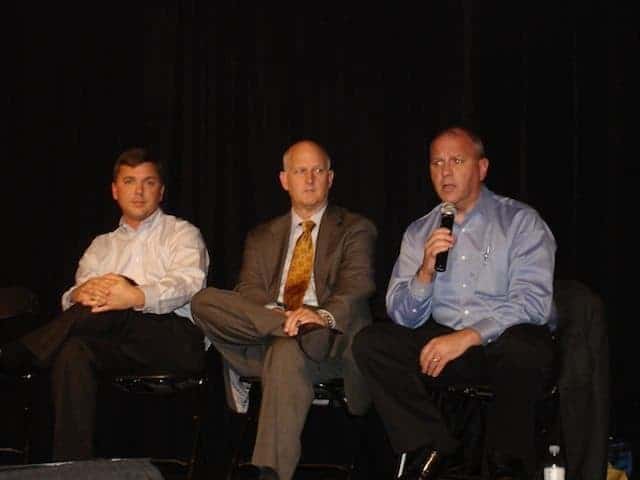According to a panel discussion hosted by the International Sleep Products Association and the Sustainable Furnishings Council during the Las Vegas Market on July 31, a national program for recycling used mattresses and regulating renovated mattresses would:
- Keep mattresses out of landfills;
- Make more steel, foam and other mattress materials available for manufacturing into new products;
- Dry up the stream of bedding products making its way to unscrupulous renovators;
- And create a level playing field for retailers and manufacturers.
Panelists included Doug Guffey, president of mattress manufacturer Sleep Inc. in Corsicana, Texas; Barrie Brown, a veteran retailer and owner of Sleep. You Deserve More, a sleep shop in Campbell, Calif.; and Joe Paviglianti, principal and co-founder of Spare Our Landfills, a nonprofit in Phoenix that seeks to keep mattresses and other products out of landfills.
The discussion was moderated by Dan Connelly, executive director of the Product Management Alliance, a nonprofit group that represents a number of consumer product industries in opposing state-by-state efforts to impose extended producer responsibility programs on industry. ISPA is a founding member of the group. EPR laws require industries to establish and fund programs to recycle used products.
The discussion, which was well attended by mattress retailers, manufacturers and suppliers, was an opportunity to highlight one of the biggest threats to the mattress industry—state-by-state efforts to create costly, inefficient mattress recycling mandates through EPR legislation, said ISPA President Ryan Trainer. Such bills recently have been considered in Connecticut and Rhode Island, but failed to be passed into law. Another bill currently is being considered in California.
ISPA has proposed a national recycling plan that it says would be more efficient, practical and cost-effective than state efforts.
Brown, who spent much of his career as president of multistate retail chains Mattress Giant and Sleep Country USA, said he is concerned about retailers having to deal with as many as 50 different recycling laws, particularly if they make mattress sales and disposal more expensive in one state than another. He pointed to sales taxes as an example. For instance, he said, Oregon doesn’t have a states sales tax, but nearby Washington does.
“Consumers will drive to another state to save $10 on a $399 mattress,” he said. Brown doesn’t want mattress retailers to face a similar situation if individual states impose varying fees at retail to pay for recycling efforts at the end of a mattress’ useful life.
“If there are different laws in the states, consumers will go to the cheapest state (to buy a mattress),” he said.
When Brown ran the Mattresses Unlimited chain in Nashville, Tenn., he worked with the Students in Free Enterprise program at Belmont University to recycle mattresses, touting the efforts in the mattress stores themselves. Consumers were appreciative of the recycling program.
“Recycling is the right thing to do—for the environment, for the industry,” Brown said.
As a mattress manufacturer, Guffey also is concerned about state-by-state laws.
“We don’t want to deal with 50 state regulations,” Guffey said. “We want to set our own destiny regarding recycling.” Together, Sleep Inc. and its parent company Corsicana Bedding have 13 mattress manufacturing facilities.
So important is the issue of recycling to Corsicana owner Carroll Moran that his company has its own recycling facility, working with the company’s retailers to process mattresses at the end of their useful lives, Guffey said. Last year, it kept 60,000 beds out of Texas landfills. The company employs its own workforce of recyclers, who manually tear down beds. It also manages all the logistics of the operation, including picking mattresses up from retailers.
“Our goal is just to break even, not to make a profit,” Guffey said.
Consumers are comfortable with the idea of recycling a variety of products, Paviglianti said. His organization recently conducted a survey showing that 70% of consumers recycle either because they think it’s the right thing to do or because their community requires it. Ideally, he said, in five years, consumers nationwide will expect that the new mattress they purchase will eventually be recycled and won’t take up valuable landfill space.
A national mattress recycling program also would keep used mattresses out of the marketplace, Brown said, estimating that as much as $1 billion worth of used mattresses are renovated unscrupulously (often inadequately and without meeting current flammability or hygienic standards), meaning the industry is losing that much each year in new mattress sales.
When talking about recycling, the panelists said members of the industry should make it clear to consumers and others that by “recycling” they mean dismantling mattresses into their components for reuse in other products, such as foam for carpet underlay.
“We don’t allow any material to leave our recycling facility that can be used in any way as a bed again,” Paviglianti said, referring to his company’s involvement with a used mattress recycler in the Seattle area. “It all has other uses.”
Summing up his company’s thoughts about a national mattress recycling program, Guffey said, “We view recycling as a responsibility. It’s a problem that’s been there for a long time. If we work collectively as an industry, we can solve it.”





